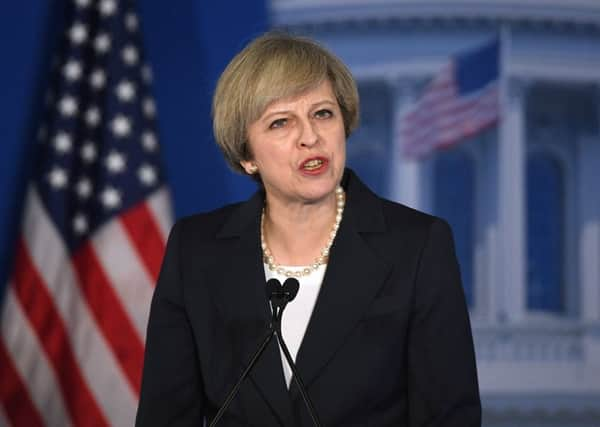Tom Richmond: Theresa May's Brexit position not as dominant as it appears


This was the PM reasserting her authority after a torrid 96 hours dominated by her White House soiree with Donald Trump and less than sure-footed reaction to the US President’s draconian travel ban imposed, insensitively, on Holocaust Memorial Day.
They were even more cockahoop when the Commons approved the first stage of the legislative process to begin Brexit by 498 votes to 114, after 47 Labour MPs defied Mr Corbyn’s endorsement of the Government’s strategy as the Opposition becomes conflicted by the competing demands of working class voters and its metropolitan supporters.
Advertisement
Hide AdAdvertisement
Hide AdYet Mrs May’s position is, I venture, not as dominant as it appears.
She’s made three strategic errors already. First she opposed Parliament’s sovereign right to trigger Article 50, a position that was upheld by the Supreme Court. This was an unnecessary fight.
Second, she performed a nimble U-turn and published a White Paper on her Brexit strategy, having previously declined to do so – her acclaimed speech to diplomats last month should, in fact, have been made to Parliament in the first instance.
Third, Mrs May accepted that Britain will have to leave the single market in order to regain control of immigration policy. She should have kept her options open for the forthcoming negotiations with the European Union.
Advertisement
Hide AdAdvertisement
Hide AdWhy does this matter? It paints a picture of the Prime Minister’s position being dictated by events rather than a leader dictating events. There’s a difference, and the EU will have noted this. And while this has been masked by Labour’s discord, there are early signs of Brexit dissenters coalescing around their various points of principle.
Former Chancellor George Osborne signified that the economy should take preference over immigration policy; his illustrious predecessor Ken Clarke is hobnobbing with the Scottish Nationalists and Labour’s EU enthusiasts have been meeting Tory opponents who support the single market.
With rebellions fomenting, Mrs May’s reputation will be determined by her ability to take the sting out of them at the earliest opportunity.
A RESPECTFUL word of advice to Brexit Secretary, and Haltemprice and Howden MP, David Davis – look up more when speaking in the Commons. Your head down approach, elbow leaning against the despatch box, comes over on TV as lacking confidence and authority.
Advertisement
Hide AdAdvertisement
Hide AdIF Prince Charles doesn’t want to meet President Donald Trump because of profound disagreements over climate change, the heir to the throne needs to decide if he wants to be King – or not. It’s part of the job.
IT will remain a subject of conjecture whether a desperate David Cameron asked Lord Rothermere, proprietor of the Daily Mail, to remove editor Paul Dacre because of the newspaper’s aggressive pro-Brexit stance and the Prime Minister’s incompetent inability to advocate a convincing and compelling pro-EU case.
What Tory grandee Ken Clarke’s brilliant memoir, Kind Of Blue, reveals is that Fleet Street’s influence extended far beyond the doomed appointment of Andy Coulson as Mr Cameron’s communications chief.
The then Justice Secretary despairs at being ordered by the Prime Minister in 2010 to meet Rebekah Brooks who he describes as tycoon “Rupert Murdoch’s representative on Earth”.
Advertisement
Hide AdAdvertisement
Hide AdThe reason? Ms Brooks wanted to press the case for the introduction of “prison ships” or, failing that, the introduction of “military-style boot camps”.
As Mr Clarke noted: “It now became clear why my political advisers had been fending off remarkably similar suggestions from Downing Street over the last few weeks.”
Pointing out that prison ships would be a “totally unproductive, inhumane and useless addition to a penal system”, Mr Clarke was relieved that such meetings ceased when the phone hacking scandal emerged. Yet this vignette gives credence to the view that Mr Cameron was a lightweight who never looked beyond the next set of opinion polls.
TWO other disclosures in Ken Clarke’s autobiography caught the eye. The first was how the sole purpose of one Sir Henry Yellowlees, the then Chief Medical Officer in the early 1980s, was “in keeping strict personal control over the patronage he exercised in determining which distinguished medics would receive knighthoods and other honours”.
Advertisement
Hide AdAdvertisement
Hide AdThe second was Mr Clarke, as Chancellor, sanctioning the construction of a cycling velodrome in Manchester after refusing to back bids for Britain to host the Olympics. He only agreed to this “as the modest cost would be taken straight out of our small existing sports budget”. In other words, Britain’s cycling revolution happened by political accident. At least Mr Clarke did not take the credit for the subsequent gold rush. Others would have done so.
IN lieu of last week’s comments about self-pity leadership in Leeds, it’s interesting that Bradford Council welcomed constructive discussions with Transport Secretary Chris Grayling about the importance of rail links.
Chief executive Kersten England and leader Susan Hinchcliffe pointed out that “Bradford has the youngest population in the UK, it’s perfectly placed at the heart of the North and it is ripe with potential”. They were also encouraged by the Minister’s warm response.
The outcome will be a barometer of whether local, regional and national politicians can make the Northern Powerhouse happen. It’s a good start. Watch this space...
Advertisement
Hide AdAdvertisement
Hide AdTHE versatility of acclaimed actor Sir John Hurt was such that many of the tributes overlooked his portrayal of North Yorkshire jockey Bob Champion who beat cancer to win an emotional Grand National in 1981 on the heroic and injury prone racehorse Aldaniti. The inspirational film Champions was the personification of courage and bravery, giving hope to cancer patients when treatment was so formative. How ironic that this indiscriminate disease claimed Hurt while Champion, the hero of the story, remains one of the UK’s foremost cancer fundraisers.